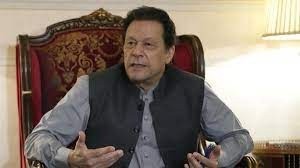
After the court procedures Mr.Khan was found guilty of failing to report the proceeds of goods sold. He claims he will appeal and disputes the accusations.
After the decision, Mr. Khan was arrested and brought from his Lahore house.
He urged supporters to challenge the decision in a pre-recorded statement that was posted online following the verdict.
In a video speech posted to X, then known as Twitter, he urged people not to stay home alone. He continued, “I’m fighting for you, the nation, and the future of your kids.”
The 70-year-old former cricketer-turned-politician was chosen in 2018, but was later removed in a vote of no confidence the following year due to disagreements with Pakistan’s potent military.
Since his dismissal, Mr. Khan has had more than 100 complaints initiated against him, all of which he claims are politically motivated.
The administration has vehemently denied that Mr. Khan’s arrest or disqualification had any political undertones, though. Politics have nothing to do with this. A person must be arrested if their guilt has been established by the court.
The verdict on Saturday focused on allegations that Mr. Khan misdeclared information about gifts from foreign dignitaries and the revenues of their suspected sale.
Rolex watches, a ring, and a set of cuff links were among the gifts, which were said to be valued at about 140 million Pakistani rupees ($635,000; £500,000).
His dishonesty has been shown beyond a reasonable doubt, according to Judge Humayun Dilawar’s verdict. Some pro-government protesters screamed “your show is over Khan” outside the courts.
The police had been told to arrest Mr. Khan right away, according to Judge Dilawar. Within 15 minutes following the verdict, videos of a procession of police cars and trucks transporting him appeared on social media.
“He has been prohibited from participating in politics for five years as a result of today’s conviction,” Mr. Panjutha added.But he will be free to return to politics if the term and the conviction are suspended, as we hope the superior courts will do.
Mr. Khan has been detained at the modest Attock jail in Punjab province, which is 52 miles (85 kilometers) from the nation’s capital Islamabad and has a long history of serving the military. According to local media, the complex has previously hosted a number of Mr. Khan’s party members.
He had evaded capture for months, with his supporters at times engaging in fierce conflict with the police to keep him from being taken into custody.
Mr. Khan was detained in May for failing to show up for court as asked. After that, the arrest was deemed illegal, and he was released.
There were demonstrations all around Pakistan on May 9, the day of his most recent detention. It was said that thousands of his supporters who were arrested took part in the demonstrations.
Since then, Mr. Khan and his political party have been subjected to a harsh crackdown, during which many of his senior leadership members were detained before making their exit from the party official. Many Mr. Khan’s strong followers, who used to frequently write about him on social media, now hesitate to voice their opinions or even covertly remove their earlier posts.
Despite protests from various human rights organizations, some of the people detained for supporting Mr. Khan will go to military courts for their trials.
In fact, the type of large-scale political protests observed in May had not taken place for several hours after Mr. Khan’s detention. The BBC Urdu team in Lahore witnessed some of his fans who had gathered outside of his residence and were chanting and waving flags being arrested by police. There is no indication of heightened security in the area of Islamabad.
As a result, Mr. Khan claimed, “they’re dismantling a democracy” because the Pakistani army is “petrified” of elections that his party will “hands down” win.
The Pakistani army is heavily involved in politics, sometimes taking control through military coups and other times working behind the scenes.
Many analysts think the military played a role in Mr. Khan’s victory in the 2018 election.
He has been one of the army’s most outspoken detractors in opposition, and according to observers, support for the army has decreased.
Since being removed, Mr. Khan has advocated for early elections, but Saturday’s decision means he will be unable to participate in the eagerly awaited vote.
Ms. Aurangzeb emphasized that there was “no correlation” between the decision on Saturday and the possibility of elections.
On August 9, Pakistan’s parliament will be dissolved, and a caretaker administration would lead the country until the elections.
Although they should happen by early November according to the constitution, no election date has been set.
The nation’s law minister, however, stated on Saturday that the new elections would have to be held once the results of a new census were put into effect.
According to Azam Nazeer Tarar of Geo News TV, drawing up new constituency boundaries based on the results of the count might take around four months, which could push back the election by many months.


Share your thoughts